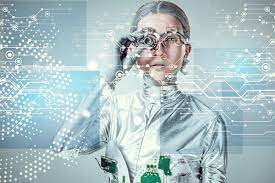How Artificial Intelligence is Transforming the World
Artificial Intelligence (AI) has been transforming the world at an unprecedented pace. The technology has been making waves in various fields, ranging from healthcare and finance to transportation and education. AI is revolutionizing the way we work, communicate, and interact with each other, bringing in new possibilities and opportunities.
- AI in Healthcare
The healthcare industry has been one of the most significant beneficiaries of AI technology. AI-powered systems can analyze vast amounts of medical data to detect patterns and identify potential health risks. For example, AI can analyze medical images to detect tumors or other abnormalities, helping doctors make accurate diagnoses and develop effective treatment plans.
AI is also helping to improve patient outcomes by providing personalized care. AI-powered chatbots can provide patients with information on their symptoms and suggest appropriate treatments. Moreover, AI can be used to monitor patients' health remotely, providing real-time data on their vitals and alerting doctors to any potential health issues. This can help prevent medical emergencies and ensure that patients receive timely care.
- AI in Finance
The finance industry has also been making significant strides in AI adoption. AI-powered chatbots can assist customers with their banking needs, such as transferring funds or checking their account balances. This reduces the workload for customer service teams and ensures that customers receive prompt assistance.
AI algorithms can also analyze financial data to identify patterns and make predictions. For example, AI can analyze stock market trends and make investment recommendations based on historical data. Additionally, AI can detect fraud and other financial crimes, helping to protect businesses and their customers.
- AI in Transportation
The transportation industry is another area where AI is making significant advances. Self-driving cars, powered by AI, are becoming increasingly common, providing safer and more efficient transportation options. AI algorithms can analyze traffic patterns and make real-time decisions on the best route to take, reducing travel time and improving safety.
AI can also be used to optimize transportation networks, such as public transit systems. By analyzing data on passenger behavior and traffic patterns, AI algorithms can determine the most efficient routes and schedules, reducing wait times and improving overall efficiency.
- AI in Education
AI is also transforming the education industry, enabling personalized learning experiences for students. AI-powered systems can analyze data on student performance and adapt the curriculum to meet their individual needs. For example, if a student is struggling with a particular subject, an AI-powered system can provide additional resources and support to help them succeed.
AI can also be used to create more engaging and interactive learning experiences. For example, AI-powered chatbots can provide students with real-time feedback and assistance, helping them to learn more effectively. Additionally, AI can be used to develop educational games and simulations, making learning more fun and engaging for students.
- AI in Manufacturing
The manufacturing industry is also experiencing significant transformation through AI technology. AI-powered systems can monitor production lines and identify potential issues before they occur, reducing downtime and improving overall productivity.
AI can also be used to optimize supply chains, ensuring that businesses have the right materials and resources when they need them. For example, AI algorithms can analyze data on customer demand and predict future needs, enabling businesses to make informed decisions on production and inventory management.
- AI and Ethics
As AI continues to transform the world, it's essential to consider its ethical implications. AI systems can reinforce existing biases and perpetuate social inequalities, leading to discriminatory outcomes. Additionally, AI can raise concerns about privacy and security, as well as job displacement.
To address these issues, it's important to develop AI systems that are transparent and accountable. This requires ethical guidelines and regulations that promote fairness, equity, and social responsibility. Additionally, it's essential to involve diverse stakeholders in the development and implementation of AI systems to ensure that their perspectives and concerns are taken into account.
- The Future of AI
The future of AI is promising, and we can expect to see even more advanced applications in various fields. For example, AI could be used to develop new drugs and treatments, leading to significant advances in healthcare. Additionally, AI could be used to create more efficient and sustainable energy systems, helping to mitigate the impacts of climate change.
Moreover, AI can help address some of the world's most pressing challenges, such as poverty, hunger, and disease. By analyzing data on social and economic trends, AI can help identify the root causes of these issues and develop effective strategies to address them.
However, as AI becomes more advanced, it's essential to ensure that its development and deployment are guided by ethical principles. This requires ongoing dialogue between stakeholders, including businesses, governments, and civil society organizations, to ensure that AI is used to promote the public good.
Moreover, it's important to ensure that AI systems are designed with safety and security in mind. AI-powered systems can be vulnerable to cyberattacks and other security threats, which can have serious consequences for individuals and society as a whole.
In conclusion, AI is transforming the world, enabling businesses and organizations to automate processes, improve efficiency, and provide more personalized services to customers. However, as we embrace these new technologies, it's essential to consider their ethical implications and ensure that they are used to promote fairness, equity, and social responsibility. By doing so, we can harness the full potential of AI to create a better future for all.


No comments yet